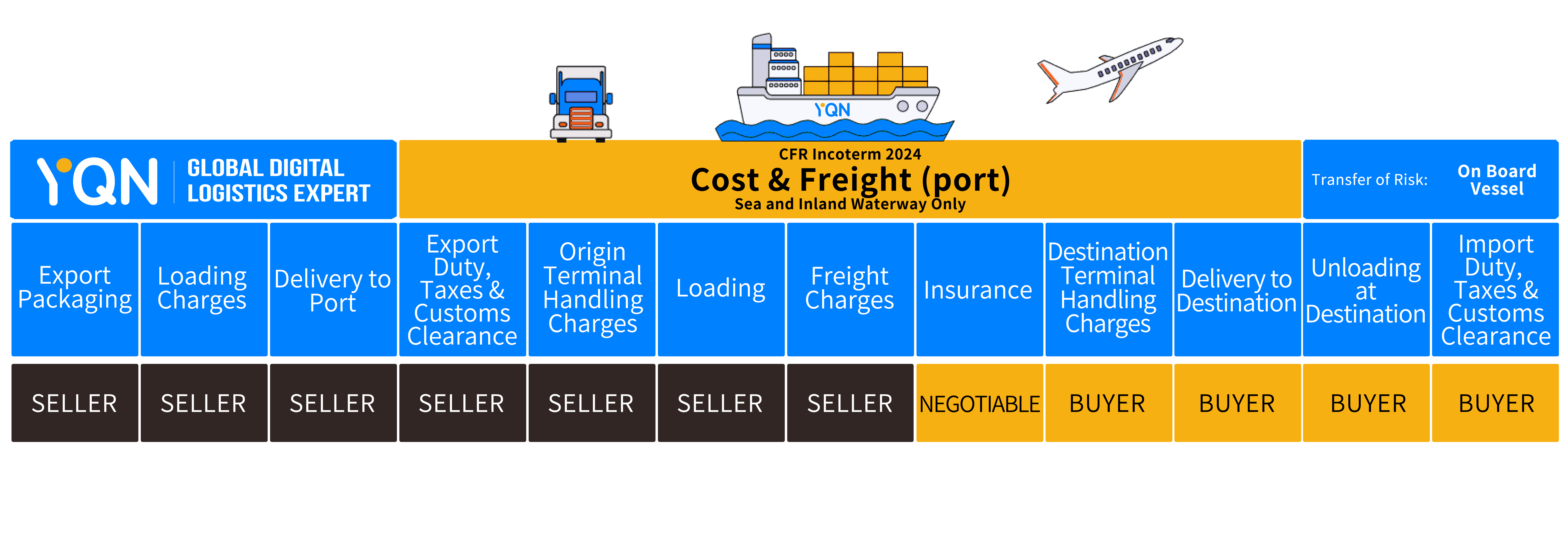CFR Incoterms: Applications & Limitations in Shipping
Sep 26, 2024
Introduction
Incoterms, short for International Commercial Terms, are standardized agreements used globally to define the responsibilities of buyers and sellers in international transactions. In this article, we will take a closer look at the incoterms CFR (Cost and Freight) including its application and limitations in shipping. Of course, you can get more information by contacting YQN Logistics.
The definition of CFR in shipping
CFR, short for Cost and Freight, is a term under which the seller is responsible for arranging transport of goods to the named port of destination and paying the related transportation costs.
Although the seller bears all the costs of transporting the goods to the port of destination, all risk passes to the buyer from the moment the goods are loaded onto the vessel at the port of loading. The benefits of this arrangement include cost predictability and simplified logistics planning for the buyer.
Can CFR be used for air transportation?
The CFR incoterm is only available for sea freight and inland waterway shipments. For air freight, the ICC recommends the use of CPT incoterm, which are specifically designed for air and other modes of transportation.
Advantages of CFR in international trade
CFR simplifies the export process for the seller by limiting the cost and risk of arriving at a predetermined delivery point.
For the buyer, CFR specify all costs up to the port of destination, facilitating more effective budget management and financial planning. Through the analysis of case studies, this paper shows how companies can use CFR to gain a competitive advantage in international trade.
Limitations and Considerations of CFR
One of the major disadvantages of CFR is that it is more difficult for the buyer to control over the shipment process once the goods have been loaded onboard the vessel and additional costs may be incurred once the goods arrive at the port of destination.
In addition, the seller is not required to insure the goods in transit under CFR terms. Therefore, the buyer should protect his interests by purchasing additional insurance to cover possible losses after loading.
Choosing the Suitable Incoterms for your shipment needs
Choosing the appropriate incoterms is based on specific business needs and trade dynamics. We recommend that you consult with professionals from YQN Logistics for personalized advice. These professional insights can help companies make informed decisions, choosing incoterms that best align their operational strategies and risk management needs.
Conclusion
The CFR plays an important role in international trade, and understanding and properly using incoterms is critical to improving trade efficiency and risk management. All trade participants are encouraged to learn and adapt these terms to optimize their international trade practices.
If you would like to learn more about CFR (Cost and Freight), please contact our logistics experts at YQN Logistics. Manage your supply chain today!
-----------------------------
YQN Operation Team
info@yqn.com





